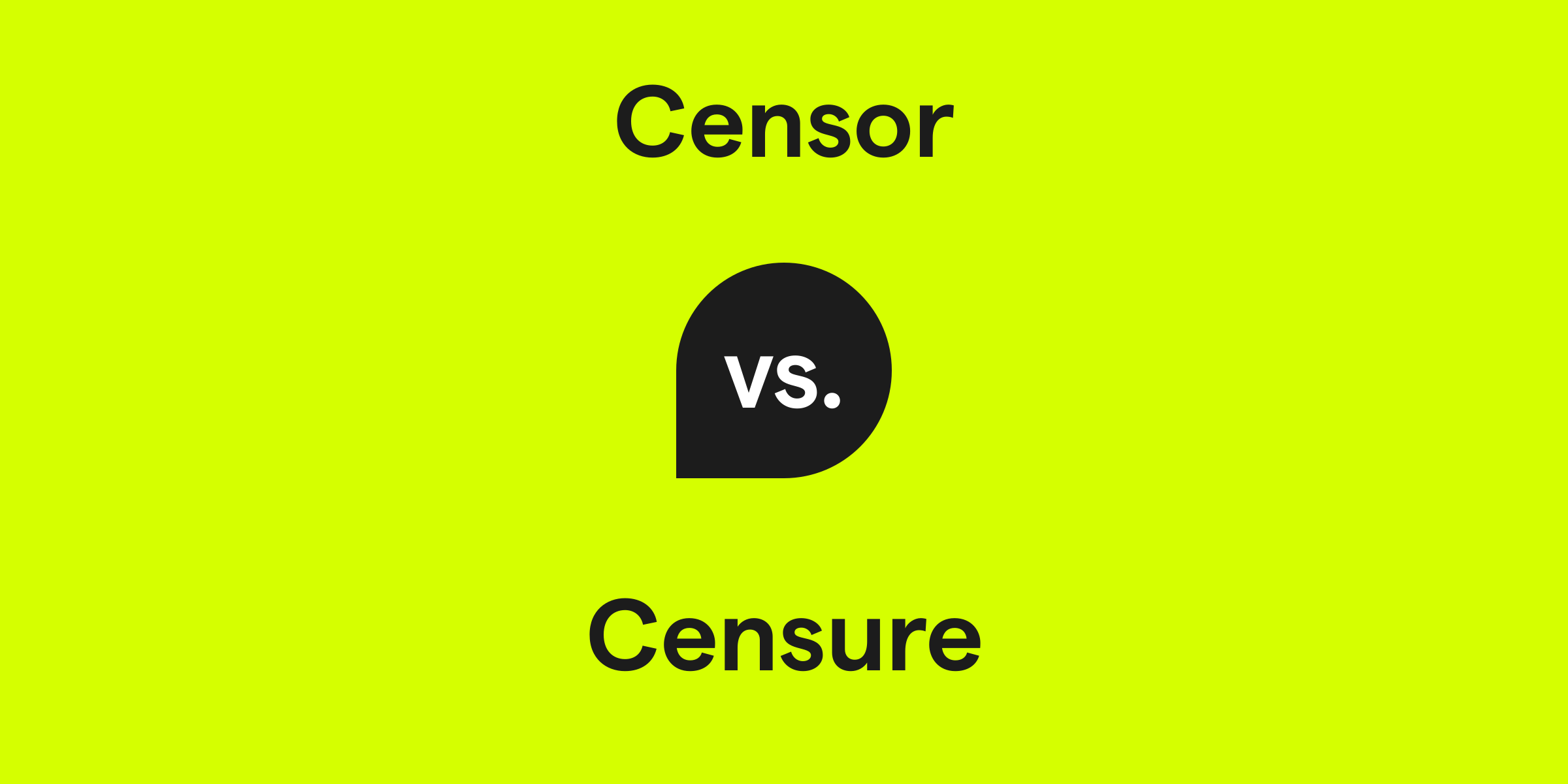Censor vs. Censure: What's the Difference?
Censor and censure may sound similar, but they have distinct meanings and uses. A censor is someone who examines materials such as books, movies, or news articles and suppresses parts deemed offensive, inappropriate, or a threat to security. The action of suppression is also referred to as censoring. On the other hand, censure is a formal expression of disapproval or criticism, often used in official contexts. It does not involve suppression or removal of content, but rather the condemnation of actions or behavior.

How do you use the word censor in a sentence?
Use the word censor when you are discussing the act of suppressing material that is considered inappropriate or sensitive. It can refer to the actions taken by individuals or authorities to control information and prevent certain ideas or images from being disseminated. Censor primarily functions as a noun but can also be a verb when someone is carrying out the act of censorship.
Examples of censor in a sentence
- The government appointed a censor to review all foreign films before they could be shown in domestic cinemas.
- Artists often find creative ways to express themselves despite the strict censoring of their work.
- Parents sometimes act as censors within the home, restricting what their children can watch on television.
How do you use the word censure in a sentence?
The word censure is used to signify formal disapproval or criticism. It is most often encountered in political, legal, and professional contexts. Censure can serve as a noun referencing the act of expressing disapproval or as a verb to describe the act of delivering this criticism. It does not imply restriction of speech but rather a reprimand or condemnation of certain actions or statements.
Examples of censure in a sentence
- The senator faced censure from her peers over her controversial remarks on the senate floor.
- Despite the censure from international communities, the country proceeded with its plans.
- The committee issued a formal censure against the company for its unethical business practices.
Censor and censure definition, parts of speech, and pronunciation
Censor definition:
Censor (noun) - An official who examines materials like books, films, or news to suppress any content deemed objectionable on moral, political, or other grounds. Censor (verb) - To examine and suppress unacceptable parts of a work, communication, or information.
Censor parts of speech:
Censor pronunciation:
Censor is pronounced as /ˈsen.sər/.
Censure definition:
Censure (noun) - The expression of formal disapproval. Censure (verb) - To express severe disapproval of (someone or something), typically in a formal statement.
Censure parts of speech:
Censure pronunciation:
Censure is pronounced as /ˈsen.ʃər/.
Censor (noun) - An official who examines materials like books, films, or news to suppress any content deemed objectionable on moral, political, or other grounds. Censor (verb) - To examine and suppress unacceptable parts of a work, communication, or information.
Censor parts of speech:
- As a noun, censor refers to the person performing the act of censorship: 'The film board's censor reviewed the movie ratings.'
- As a verb, censor describes the action of removing objectionable content: 'The editor had to censor the manuscript before publication.'
Censor pronunciation:
Censor is pronounced as /ˈsen.sər/.
Censure definition:
Censure (noun) - The expression of formal disapproval. Censure (verb) - To express severe disapproval of (someone or something), typically in a formal statement.
Censure parts of speech:
- As a noun, censure represents a formal expression of disapproval: 'The council passed a vote of censure against the mayor.'
- As a verb, censure is the act of formally reprimanding someone: 'The ethics board decided to censure the lawyer for misconduct.'
Censure pronunciation:
Censure is pronounced as /ˈsen.ʃər/.
Censor vs. censure in a nutshell
Understanding the distinction between censor and censure is key to using them correctly. A censor suppresses content that may be offensive or harmful, whereas censure is a formal rebuke for behavior or activities deemed improper. While censor often deals with the control of information and media, censure relates to expressions of disapproval without direct interference with freedom of speech. Grasping these nuances helps ensure precise communication, particularly in discussions about media regulation or formal condemnations.
Get AI Writing Assistance Wherever You Type
Make sure your vocabulary is on point and every punctuation mark is in the right place, no matter where you’re working. Grammarly works across more than 1 million websites and apps so you can improve your writing without copying, pasting, or breaking focus.

More Commonly Confused Words
Interest piqued? Pore (not pour) over other commonly confused words to help your writing reach peak (not peek) performance.